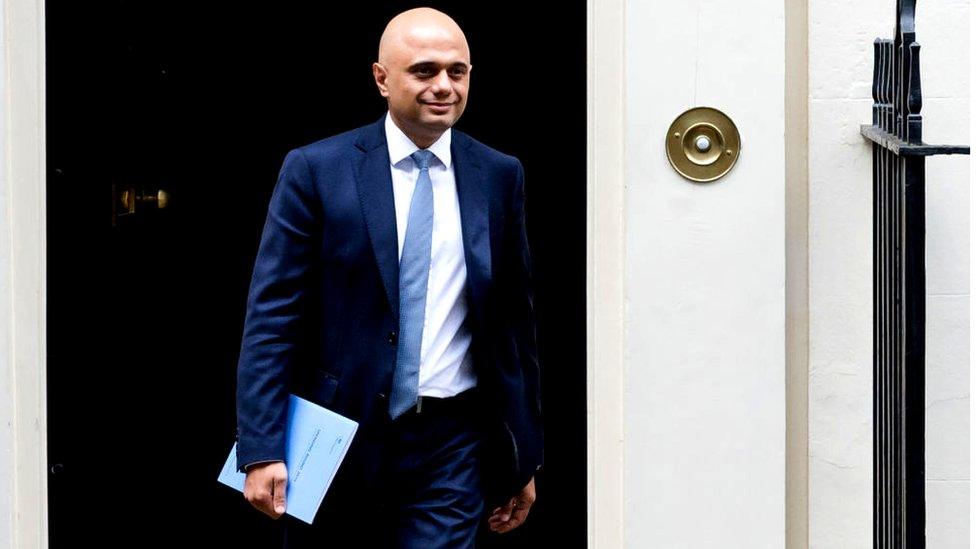Westminster election leaves Scotland in a budget bind
- Published

Sajid Javid was due to present his budget Bill on Wednesday
Thanks to the Westminster election, the Holyrood budget process faces a tight timetable in the new year.
MSPs will have only a few weeks to scrutinise the Budget Bill.
That means SNP ministers have limited time to secure support from opposition MSPs to get the budget passed.
Wednesday should have been Budget day at Westminster, but plans for Chancellor Sajid Javid to set out the first post-Brexit Budget were pulled when Brexit had to be postponed.
The Holyrood budget was to have been published with an announcement at Holyrood on 12 December.
But that is now the day of the general election, and the Holyrood schedule will have to be reset.
Bespoke process
Derek Mackay, the finance secretary, has held meetings with opposition MSPs to discuss the problems that this creates.
He will then meet the convener of the finance committee, Bruce Crawford, who has lead responsibility for scrutiny of the Budget Bill.
Mr Crawford said: "There will have to be a bespoke process for this financial year. The government and committee will have to come to an agreement on that. The consequences are obviously challenging."

The Budget Bill is usually passed by late February, for spending to start in April. It has to be completed in time for councils to set budgets in mid-March.
It also has to set a Scottish Rate of Income Tax and set the level for business rates, without which neither can be legally collected.
Without a Budget set out at Westminster, several elements will not fall into place for the Holyrood process:
It is not clear how large the block grant from the Treasury to Holyrood will be, or for other devolved administrations. The election campaign already features some large spending commitments from the main parties, and the block grant could become significantly larger as a consequence
There has to be a calculation of the "block grant adjustment", which is the amount deducted to account for income tax revenue from Scotland no longer going to the Treasury for distribution
It is not clear how taxes will be altered at Westminster, with potential knock-on effects for Holyrood setting of the Scottish rate of income tax and its thresholds. The main UK parties are signalling their intention to make significant changes to income tax and national insurance
With no Budget, the independent Office for Budget Responsibility (OBR) will not produce its forecast for economic growth and for tax revenue next financial year. That growth path is even more uncertain than usual, and expected to be lower than the forecast set out by the OBR earlier this year
Without that information, the Scottish Fiscal Commission (SFC) cannot provide Derek Mackay with its forecast for Scottish economic growth and for revenue from income tax, which is now largely controlled at Holyrood.
A Scottish government source said the margin for variation between possible budget outcomes has been reckoned to be £1.8bn on a total of around £30bn, and with economic uncertainty and election promises, it has probably gone up since that calculation to more than £2bn.

Finance Secretary Derek Mackay will need things to fall into place before he can set his Scottish income tax rate.
A new element for consideration by MSPs this year will be the devolved budget for significant new welfare powers, expected to reach around £3.5bn in 2020-21. That is roughly eight times the size of the welfare budget in the current year.
A recent report by the fiscal experts at the Organisation for Economic Development and Co-operation recommended that MSPs should step up their scrutiny of this new element of their spending.
Its inspection of the Scottish Fiscal Commission recommended that the SFC should have a legal right to Whitehall data connected to welfare spending, that its relations with the Treasury in London should be on a firmer footing, and that its expertise should be used more effectively by Holyrood committees.
Return to uncertainty
There are also political uncertainties from Westminster. A Conservative majority government after 12 December could see Sajid Javid's Budget plan announced before Christmas, though that is not seen as likely.
Any other outcome would mean a delay in preparing a budget, and a minority Westminster administration could struggle to get a budget agreed for 2020-21.
If there is a return to the uncertainty about the basis on which the UK leaves the European Union on 31 January - the date agreed with the remaining 27 members of the European Union - that could also disrupt the budget process.
And if Brexit takes place without a deal to maintain smooth trading relations, economic forecasters expect a hit to economic growth, which would harm tax revenues.
- Published31 October 2019

- Published24 October 2019

